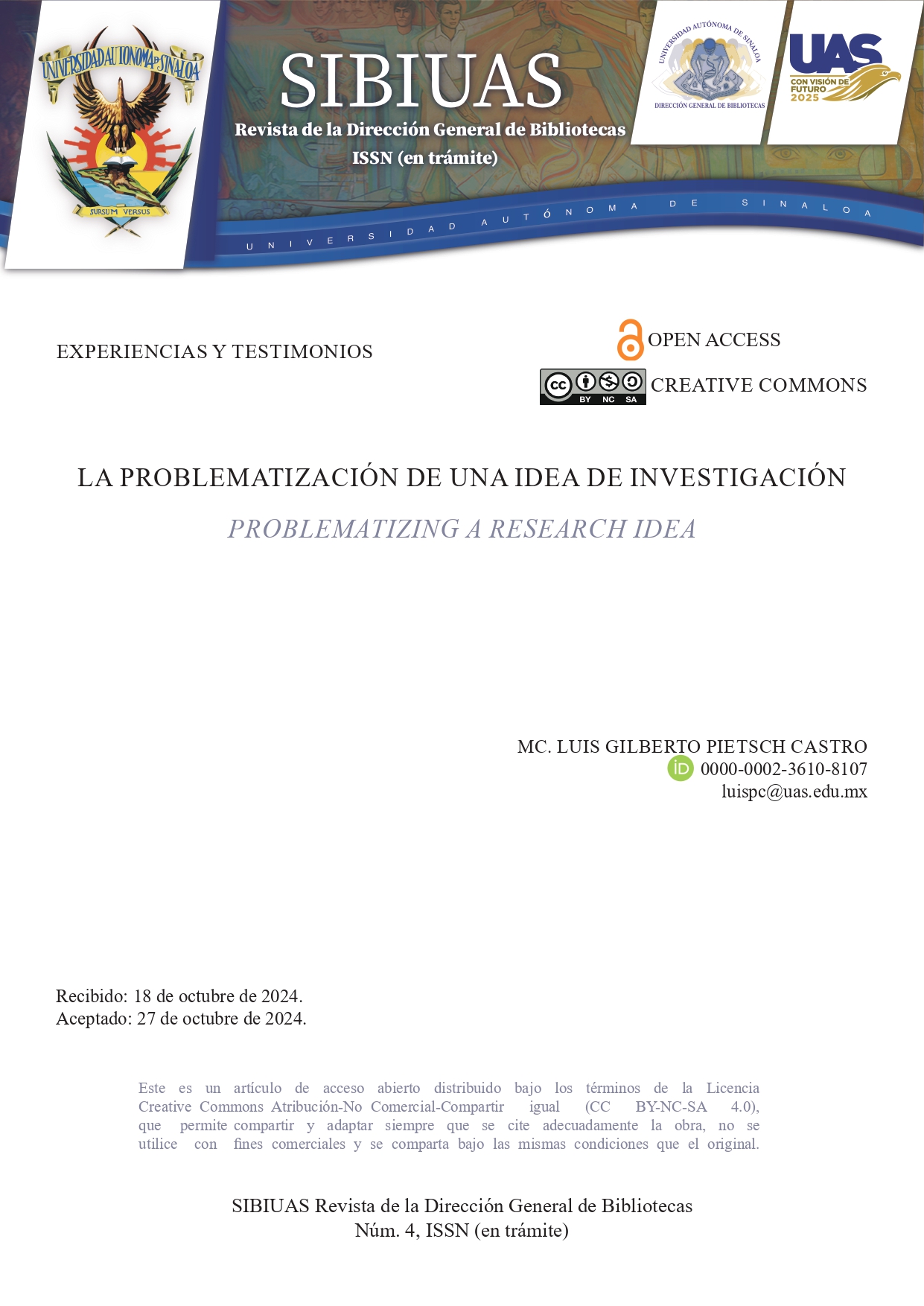Problematizing a research idea
Keywords:
Knowledge, Interest, Problem, Reality, ThesisAbstract
Defining a dissertation topic and research idea is one of the first challenges faced by a new doctoral candidate. This brief reflection addresses the favorable and unfavorable scenarios an applicant may encounter even before being accepted into a graduate program, particularly when their research interests align—or fail to align—with those of their potential advisors and the program itself. Once admitted, the next challenge involves problem formulation and research design. These are defined, explained, and conceptualized from various philosophical perspectives, ultimately leading to the core issue: problematizing a research idea. This stage combines interest, reasoning, and facts to develop statements and hypotheses that will both clarify and objectify the research approach, while also determining the most suitable methodology for its execution. The reflection presents factors and suggestions to guide a successful development of this crucial stage in doctoral studies, applicable to any context where a thesis must be developed and defended. Finally, a caution is offered regarding the potential evolution of the topic or idea, as this is closely tied to the critical thinking that students cultivate as they progress in their studies and research.
Downloads
References
Abreu, J. (2012). La Formulación de los Antecedentes del Problema de Investigación Científica. In Daena: International Journal of Good Conscience (Vol. 7, Issue 1, pp. 163–168). http://www.spentamexico.org/v7-n1/7(1)163-168.pdf
Acevedo, R., y Rivas, J. (1984). Técnicas de Documentación e Investigación II. (Módulo de Estudio) Caracas: Universidad Nacional Abierta.
Ander-Egg, E., Aguilar, M. J. (1995). Técnicas de investigación social (Vol. 24). Buenos Aires: Lumen.
Bunge, M. (2007). A la caza de la libertad: la controversia sobre el realismo. Gedisa Editorial S A.
Fuster, D. (2019) Investigación cualitativa: Método fenomenológico hermenéutico, Propósitos y Representaciones. vol.7 no.1 Lima ene./abr. 2019 http://dx.doi.org/10.20511/pyr2019.v7n1.267
Gervilla, A., y Villegas, M. (2015). El planteamiento del problema en investigación. Paradigma, 2001(1), 91–101 https://revistaparadigma.com.br/index.php/paradigma/article/view/262/260
Guillaumin, G. (2009). El relativismo epistemológico visto a través de la teoría del cambio científico de Thomas Kuhn. Relaciones. Estudios de historia y sociedad. https://www.scielo.org.mx/scielo.php?script=sci_arttext&pid=S0185-39292009000400005
Husserl, E. (1998). Invitación a la fenomenología. Barcelona: Paidós.
Meza, L. (2015). El paradigma positivista y la concepción dialéctica del conocimiento. Revista Digital: Matemática, Educación E Internet, 4(2). https://revistas.tec.ac.cr/index.php/matematica/article/view/2296
Monje, C. (2011) Metodología de la investigación cuantitativa y cualitativa, guía didáctica. Facultad Surcolombiana, Neiva.
Pérez, P. J., y Merino, M. (2021). Problemas de investigación - Qué es, características, definición y concepto. https://definicion.de/problemas-de-investigacion/
Pozo, J. I., Pérez, M. D., Domínguez, J., Gómez, M. A., y Postigo, Y. (1994). La solución de problemas. Madrid: Santillana.
Programa para el Desarrollo Profesional Docente (ProdeP). Conceptos básicos. Línea(s) de generación o aplicación innovadora del conocimiento (LGAC). https://promep.sep.gob.mx/ca1/conceptos2.html
Sampieri, R. H., Collado, C. F., Lucio, P. B., Valencia, S. M., y Torres, C. P. M. (2014). Metodología de la investigación.
Vielle, J. P. (1981). El impacto de la investigación en el cambio educativo. Perspectivas: Revista trimestral de educación comparada, (3), 337-352.

Downloads
Published
Issue
Section
Categories
License
Copyright (c) 2024 SIBIUAS Revista de la Dirección General de Bibliotecas

This work is licensed under a Creative Commons Attribution-NoDerivatives 4.0 International License.




